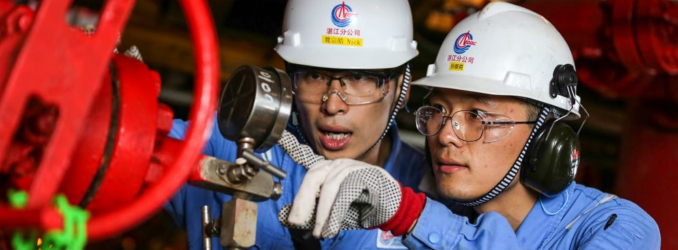(Bloomberg) – China’s Cnooc Ltd. said it’ll keep spending flat in 2025, while revising its output targets lower for this year and next.
The country’s biggest offshore oil and gas explorer produced about 720 million barrels of oil equivalent in 2024, according to statement on Wednesday, which was at the top end of its guidance and a sixth straight year of record output.
But the state-backed company also scaled back expectations for future production, predicting 760 million-780 million barrels in 2025 and 780 million-800 million barrels in 2026. It had previously said that output could rise as high as 800 million barrels for this year, and 830 million barrels for next.
The firm lowered the targets to reflect changes in the market and assets disposals, including in the Gulf of Mexico, Chief Executive Officer Zhou Xinhuai told a briefing in Hong Kong. “Supply has increased a lot already, and we need a more sound and steady strategy to achieve our objectives,” he said.
Annual budget
Cnooc kept its yearly budget unchanged at 125 billion-135 billion yuan ($18.5 billion) for 2025, after spending 132 billion yuan last year. The company, which has led Chinese output growth in recent years, is responsible for costlier deepwater projects including exploration hotspots off the coasts of Brazil and Guyana.
Zhou said an oil price of between $65 and $85 a barrel should support capital expenditure of 100 billion to 135 billion yuan a year. That in turn will be enough to meet the company’s output targets, given its relatively low production costs and technical upgrades to its operations, he said.
The company’s new target for production in 2027 is 810 million-830 million barrels. It also unveiled a new chief financial officer, and promised its annual dividend payout ratio will be no less than 45% over the next three years.
Cnooc is one of the firms caught up in worsening political tensions with the US. It was added to the Pentagon’s blacklist of companies with alleged links to China’s military earlier this month, after being sanctioned by Washington at the end of Donald Trump’s first term as US president.




